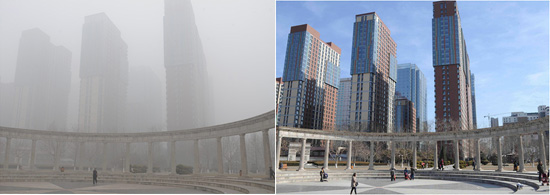|
 |
|
SHARP CONTRAST: Two photos taken one day apart show smog-shrouded Shijiazhuang of Hebei Province on February 28 (left) and clear skies the following day, illustrating the pollution problem targeted in a new white paper on human rights that emphasizes China's ecological development (WANG XIAO) |
China has adopted environmental protection as a basic national policy and the country has combined its human rights endeavors with economic, political, cultural, social and ecological development, said China's latest human rights report.
The State Council Information Office released the Progress in China's Human Rights in 2012 white paper on May 14. The emphasis on human rights protection in ecology is one of the highlights of the document.
It is China's 10th white paper on human rights since 1991, detailing the world's most populous country's progress in human rights protection in economic, political and social development. The document also addresses cultural services and ecological progress, as well as foreign exchanges and cooperation.
"The country's first white paper prioritized people's rights to subsistence and development," Zhang Wanhong, an associate professor at the Public Interest and Development Law Institute of Wuhan University, told China Radio International. "Now great importance has been attached to ecological civilization, cultural development and social construction."
Ecological civilization is a Chinese expression referring to environmental progress.
"It shows the Chinese Government is getting increasingly closer to the actual demands of society in terms of ensuring and developing human rights," said Zhang.
Broader rights
Faced with increasing resource constraints, severe environmental pollution and degradation of the ecosystems, China is working to raise awareness of the need to respect, accommodate and protect nature and to give high priority to making ecological progress and incorporating it as a primary goal of the government.
"The government has realized it has to be far-sighted when it comes to the protection of human rights," said Zhou Wei, Director of Sichuan University's Center for Human Rights Law.
During the 11th Five-Year Plan period (2006-10), China's fiscal investment in environmental and ecological protection was 3.71 times that during the previous five years, according to the white paper.
Moreover, the Central Government has earmarked special funds for projects such as rural environmental protection and integrated prevention and control of heavy metal contamination in some key areas. Legal and policy frameworks have been established to protect citizens' environmental rights.
Meanwhile, routine monitoring of surface water, air quality, soil acidity, dust storms, sources of drinking water, oceans and urban noise has been further tightened.
"Environmental protection matters to the human rights of not only our generation, but generations to come," said Zhang Yonghe, a professor at the Center for Education and Study of Human Rights under the Southwest University of Political Science and Law.
The white paper also says that practical measures have been taken to ensure citizens' right to know and to be heard.
Government information, such as budgets and expenses, has become more accessible to the public. The Communist Party of China has continued to press ahead with making Party affairs public and established a spokesperson system for Party committees.
The Internet has become an important channel for citizens to exercise their rights to know, participate, be heard and supervise, said the white paper.
"Rapid development of information technology has given the public greater power to acquire information and express their opinions," said Song Jianwu, a professor at China University of Political Science and Law.
To safeguard online information security and protect citizens' legitimate rights and interests, China's top legislature approved the Decision on Strengthening Online Information Protection in December 2012.
An important milestone in the development of China's human rights was the formation of a socialist legal system with Chinese characteristics in 2010, according to the paper. The legal system "ensures that the country's human rights protection is done within the framework of the law."
| 